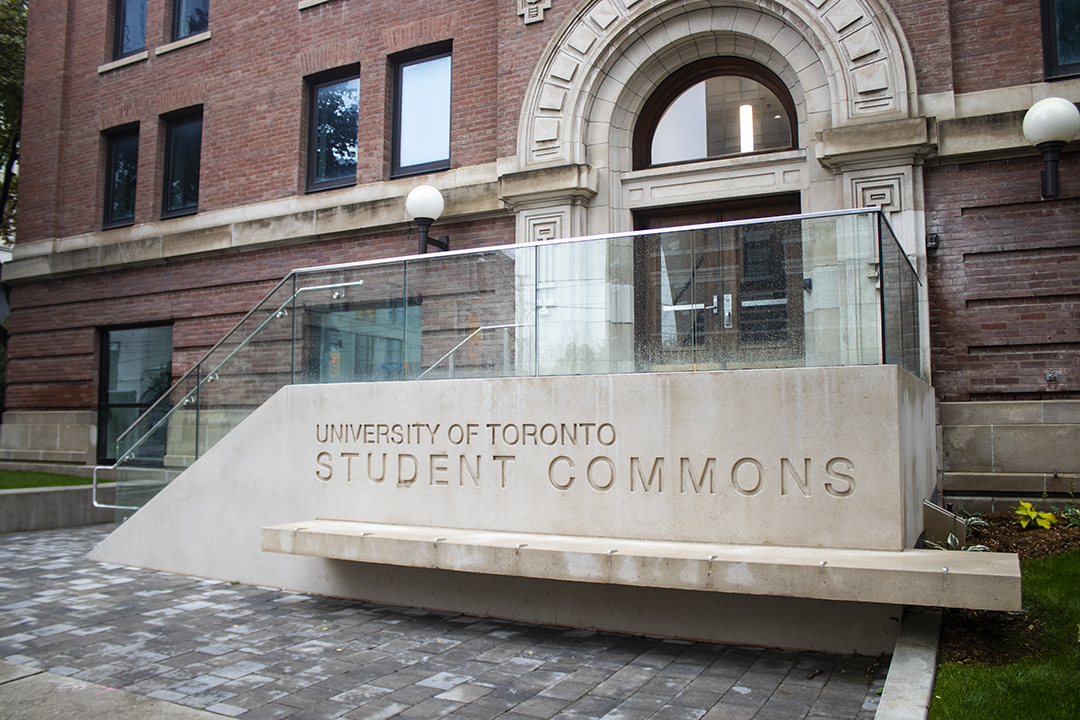At the University of Toronto Students’ Union (UTSU) February board meeting, the board discussed how to address a recent motion to boycott firms complicit in the occupation of the Palestinian territories. Citing the divisiveness and vagueness of the motion, St. Michael’s College Director David D’Aversa resigned at the meeting.
Vice-President Professional Faculties Cathy Wang also submitted her resignation from the position at the meeting due to personal reasons and workload.
Executives also discussed the union’s ongoing projects.
Israel-Palestine divestment motion
After the UTSU’s Special General Meeting on February 16, students decided to pass a motion commiting the UTSU to divest from “firms complicit in the occupation of Palestinian Territory.”
To gain clarity about the motion’s implications, the UTSU voted to “engage in open consultation with stakeholder groups on campus” and consult with reputable international sources. The investigation’s conclusions will be presented at the April BOD meeting, where the board will have to decide how to implement the students’ mandate.
The motion to divest also prompted the resignation of director David D’Aversa, who made a statement at the meeting explaining his decision. D’Aversa told the board that he decided to resign because he believes the motion undermines the UTSU’s purpose and lies outside of its scope.
“I believe that we are an apolitical body that advocates for the rights of all students and I’m submitting my resignation here because I think we’re moving in the wrong direction as a body,” said the former St. Michael’s College representative.
“The motion was divisive, vague, the implications left up to interpretation… It sets a precedent and it puts the UTSU in a very vulnerable position,” he added. “The reason why I feel so strongly on this is that I know and I’ve seen firsthand the great work that we’re all capable of as the UTSU.”
D’Aversa also expressed his disappointment with the way the motion had been handled. “What’s clear now [about the discussion on the motion] is that many people feel that they didn’t have the chance to express themselves.”
He also called attention to the way this issue has overtaken other discussions about campus issues. D’Aversa said he was disappointed that they did not talk about “the great work” the UTSU has accomplished in the past year in assisting students with academics and with mental health during the pandemic.
Vice-president professional faculties resigns
At the meeting, the board acknowledged Wang’s resignation from the position of vice-president professional faculties. Wang submitted her resignation on February 6.
UTSU President Alexa Ballis spoke on her behalf, saying that she stepped down due to personal reasons and because of her workload.
“She really appreciated the opportunity to serve as a member of the board and [be] able to advocate for professional faculties students. And I know that it was a very hard decision to make, but it was the one that she needed,” said Ballis.
Student aid referendum
The UTSU’s quarterly budget report leaves it on track to end the year with surpluses in many budget areas.
The pandemic has also impacted how the UTSU’s budget needs have changed. “There were some things that we anticipated happening, which didn’t end up happening given COVID-19,” said Fiona Reuter, the UTSU’s vice-president operations. However, the pandemic has also corresponded with a dramatic uptick in the number of students that are applying for funds. In response, the board is hosting a referendum to increase the levy for the union’s student aid program from $2 to $3.
One participant also proposed an expansion of the UTSU’s student refugee program. “We’re only hosting one singular student at New College at the moment, and I think that this can be expanded throughout our further faculties and federated universities,” they said.
If students vote to increase funding for campus chapters of the World University Service of Canada, the university will be able to host another refugee student. However, Social Science Director Victoria Liu questioned whether the UTSU could do more by asking for funding from individual colleges, potentially being able to host “one more refugee student for every college.”
Recent initiatives
During the meeting, board members drew attention to some of the recent initiatives the UTSU has undertaken.
Ballis reported on the launch of the Students for Survivors Campaign. This campaign was created in response to recent allegations that former Trinity Provost Andy Orchard and members of the Faculty of Music committed sexual harassment against students.
The three-month campaign includes events aimed at supporting and advocating for survivors of sexual violence, including an art showcase, performances, and care kits. “Folks are also tabling across campus to spread awareness, and it was really wonderful speaking with students about [the campaign],” said Ballis.
So far, the Prevention, Empowerment, Advocacy, Response, for Survivors Project (PEARS) and the UTSU have jointly released a video titled “Surviving the Centre,” where campus leaders and survivors read student testimonials about experiences with the U of T Sexual Violence Prevention and Support Center (SVPSC).
These statements have been collected by PEARS through an anonymous survey, which is still active and accepting responses. The responses PEARS has collected from this survey express frustrations about the SVPSC’s response time, its accessibility, and ways that it coerces students to avoid reporting. This frustration from students has fuelled plans from PEARS to hold a protest in April.


